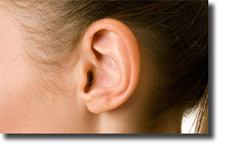Ear Congestion

Causes Of Ear Congestion
Most of us suffer from the effects of ear congestion at one time or another. Typically it is a temporary condition, often accompanying nasal congestion due to allergies, a cold, or the flu. Occasionally the congestion lingers or becomes chronic. It can be accompanied by pain or other symptoms suggesting something is definitely wrong. In this latter situation, medical assistance will be required.
|
|
The most usual symptom of ear congestion is muffled hearing. This reduction in our ability to hear well may happen over a period of time, or may occur suddenly. There are other symptoms as well, which may accompany a diminished ability to hear out of the ear, or may occur separately. These symptoms are popping or cracking noises, a "stuffy" sensation, or a whooshing or ringing sound. If the congestion is related to nasal congestion, the medication which relieves the nasal congestion will often alleviate the ear congestion symptoms at the same time. If only the ear is involved, there may or may not be over the counter medications that can be of help, and if the condition persists (for more than 48 hours in young children) a physician should be consulted.
The ear appears to be one of the more disease-free organs of our body, and congestion or loss of hearing is seldom disease related. There is a disease of the inner ear however, called Meniere's disease, which can produce congestion. There are no over the counter medications on the market which can help treat a disease of the inner ear, and professional help is the only option open to you in a case such as this. It is also possible that due to a disease, infection, or injury, a growth or lesion in the inner ear could give rise to symptoms of ear congestion. Again, professional medical help is the only option open.
|
|
Outer Ear Canal Problems Lend Themselves To Self Treatment - A cause of ear congestion which can be treated with medicine you can purchase, is an accumulation and compaction of ear wax. This of course occurs in the outer ear. A commercially available product, such as Debrox, is quite effective in dissolving ear wax and clearing up blockage in the outer ear canal. Hydrogen peroxide, administered through an eye dropper, also works well. (You have to remember to tilt your head or it gets messy). Attempting to open the blockage with a Q-Tip is definitely not a good approach.
The Eustachian Tube Is Often The Source - The Eustachian tube connects the middle ear to the back of the nose, and functions to regulate air pressure within the middle ear. It is normally closed. When we yawn, or our ears pop when experiencing a change in altitude, or the cabin pressure in an airplane is changing, the Eustachian tube is opening and doing its job. If it were not for this tube, the middle ear would have a pocket of air which could not adjust to outside air pressure changes, and unable to have access to occasional "fresh" air and drainage, would be subject to chronic infections and other problems. The Eustachian tube performs a drainage function, draining the inner ear of any infections material or debris, which may have happened to accumulate there. Whenever the Eustachian tube itself is blocked, we can experience the symptoms of ear congestion, popping, clicking, and a general feeling of stuffiness. This happens when the middle ear begins to experience a vacuum, causing fluids and material to be drawn into it, resulting in a degradation in hearing and possible infection.
When your Eustachian tube becomes partially or fully blocked, relief can often be found through chewing. Swallowing water while pinching the nose is another time tested remedy. A nasal decongestant will sometimes aid in opening up the Eustachian tube. Even an oral decongestant can sometimes help. The relief may be permanent, or only temporary. Very young children and infants seem particularly susceptible to ear congestion, which often is the result of a blockage of the Eustachian tube. Care needs to be taken in administering any over the counter medication to young children, and is generally not a good idea if toddlers or babies are involved. When someone very young is suffering from ear congestion they will usually let you know about it, though they may not be able to tell you what the problem is, unless it's by putting their hand on their ear. If the condition continues for more than 48 hours, or if it seems to be getting worse, by all means see a doctor.
Ear congestion can be a temporary nuisance or a serious disorder. As a rule of thumb, if it lingers more than 48 hours, and an accumulation of ear wax does not appear to be the cause, it is advisable to see your doctor.